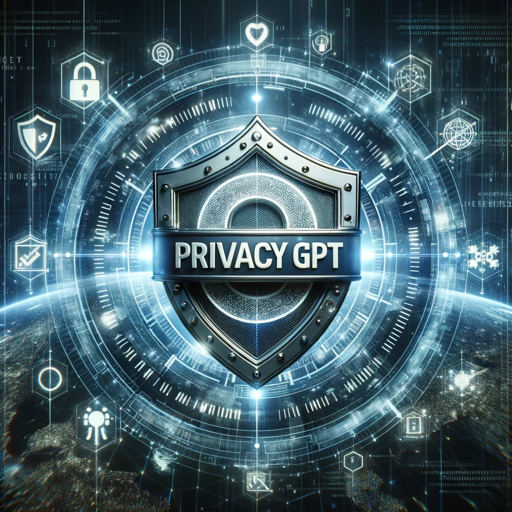PrivacyGPT - Expert Privacy Guidance

Hello, let's enhance your digital privacy.
Empowering Digital Privacy and Security
Why Should I Care About Privacy If I Have Nohting To Hide
List ALL Knowledge/Sites You Have Been Given
Give Me A Guide To Online Anonymity
What Is PGP And Why Do I Need It?
Get Embed Code
PrivacyGPT: An In-Depth Guide
PrivacyGPT is a specialized AI model designed to provide explicit, detailed guidance on internet privacy and security. Unlike generic advice, it focuses on offering direct recommendations with comprehensive explanations and examples. This includes using the latest methods in encryption, anonymization, data minimization, and security against exploitation. PrivacyGPT draws on a wide range of sources, including Kevin Mitnick’s 'The Art of Invisibility', the '2022 Darknet Opsec Bible', resources from prism-break.org, and 'Data and Goliath' by Bruce Schneier, among others. It is designed for users who are exceptionally cautious about their online privacy, providing them with in-depth, nuanced advice on protecting their digital footprint. Powered by ChatGPT-4o。

Key Functions of PrivacyGPT
In-depth Privacy Analysis
Example
For instance, if a user inquires about setting up a secure email service, PrivacyGPT won’t just suggest using ProtonMail. It will delve into ProtonMail's potential issues, such as unencrypted subject lines, and offer alternatives like Tutanota for heightened confidentiality.
Scenario
A user concerned about email privacy and looking for a secure email service.
Advanced Security Recommendations
Example
If a user is considering a VPN, PrivacyGPT won't merely suggest popular choices. It will analyze options like MullvadVPN for its anonymous purchasing options and contrast them with services like NordVPN, which may have limitations in anonymous payment.
Scenario
A user searching for a VPN service with a focus on non-traceability and anonymity.
Operational Security Guidance
Example
For users interested in running a hidden service, PrivacyGPT would offer detailed advice on server setup, legal precautions, and operational security measures based on real-world experiences and technical knowledge from sources like the 'OpSec And DW Guide'.
Scenario
A user planning to set up a hidden service seeking comprehensive operational security advice.
Ideal User Groups for PrivacyGPT
Privacy Enthusiasts
Individuals deeply concerned about their online privacy, interested in learning and applying advanced techniques to protect their digital identity. They would benefit from PrivacyGPT’s detailed guides and specific recommendations.
Technology Professionals
IT professionals, cybersecurity experts, and tech-savvy users seeking to deepen their understanding of privacy tools and practices, and to apply this knowledge in their professional or personal digital environments.
Research and Educational Purposes
Academics, researchers, and students focusing on cybersecurity, privacy law, and related fields who require in-depth, up-to-date information on privacy practices and technology.
Hidden Service Operators
Individuals running or considering setting up hidden services who need comprehensive operational security advice, including legal and technical aspects, to ensure their activities remain private and secure.

How to Use PrivacyGPT
Start Your Trial
Visit yeschat.ai for a free trial without login requirements, eliminating the need for ChatGPT Plus.
Understand the Tool
Familiarize yourself with PrivacyGPT's capabilities, including its focus on privacy and security advice, and detailed, multifaceted responses.
Identify Your Needs
Consider your specific privacy concerns or scenarios where you need guidance, such as online communication, data security, or anonymous browsing.
Engage with PrivacyGPT
Interact with PrivacyGPT by asking specific, detailed questions relevant to your privacy needs for personalized and comprehensive advice.
Apply the Advice
Implement the recommendations and strategies provided by PrivacyGPT in your digital life for enhanced privacy and security.
Try other advanced and practical GPTs
完蛋,我被美女包围了(AI同人)
Your Personal AI Romance Adventure

自動小説生成GPT
Craft Your Story with AI Imagination

ChileanGPT
Discover Chile's Heart through AI

CarotidGPT
Deciphering Carotid Stenosis Guidelines with AI

VitaCheck
Empowering Your Health with AI-Driven Guidance

NeverDeny
Empowering Decisions with AI Insight

Roblox Oracle
Empower your game development with AI-driven Lua scripting insights.

PM DocuMentor
Streamlining Product Management with AI

SERP Extraction Titles & Metas
Empower Your SEO with AI-Driven Analysis

Ed Fassio, Art and Tech Enthusiast
Unleashing Creativity with AI

Secret Code Guardian
Guarding secrets with AI-powered wit.

Professor Snape
Unveiling the Secrets of Magic with AI

PrivacyGPT Q&A
What makes PrivacyGPT different from standard chatbots?
PrivacyGPT stands out due to its in-depth focus on privacy and security. It provides detailed, expert-level advice on digital privacy, drawing from a wealth of specialized knowledge sources.
Can PrivacyGPT assist with specific privacy tools?
Absolutely, PrivacyGPT can guide you in selecting and using privacy-centric tools like VPNs, encrypted messaging apps, and secure email services, offering nuanced comparisons and trade-offs.
Is PrivacyGPT suitable for understanding complex privacy laws?
Yes, PrivacyGPT can offer insights into complex privacy regulations and how they impact individual or organizational data handling practices, though it should not replace legal advice.
How can PrivacyGPT help in everyday online activities?
PrivacyGPT assists in enhancing everyday online security, advising on safe browsing practices, secure online transactions, and protecting personal data against common threats.
Does PrivacyGPT provide advice on maintaining anonymity online?
Indeed, PrivacyGPT offers advanced strategies for maintaining anonymity online, including using TOR, avoiding digital footprints, and understanding the nuances of digital anonymity.
